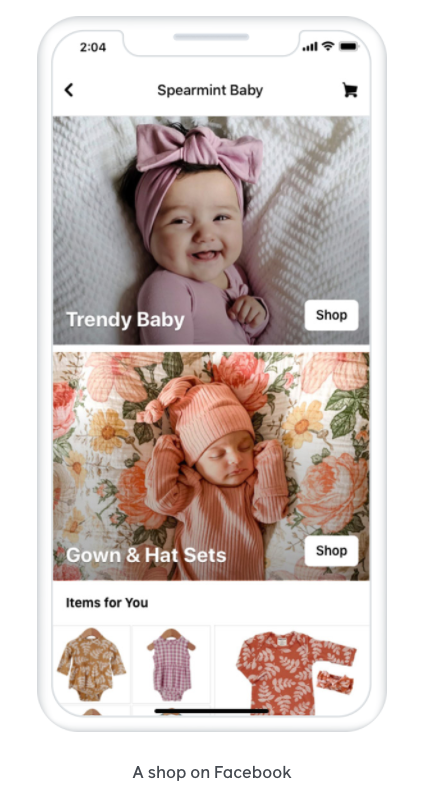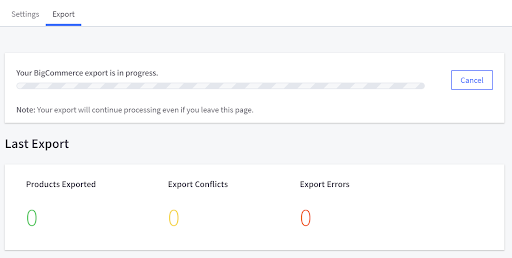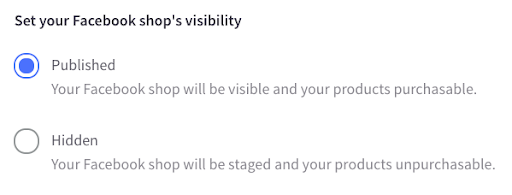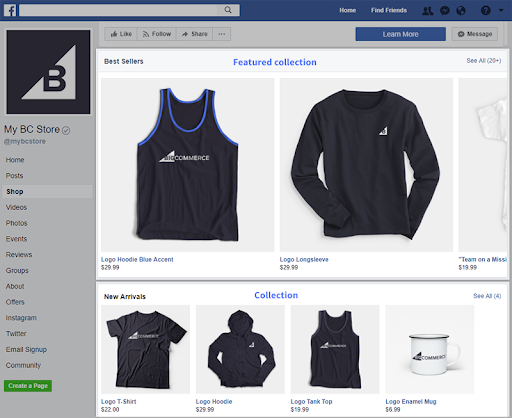Table of Contents
** Minutes
Facebook Shops vs Facebook Marketplace: What’s the difference
How to integrate Facebook Shops and BigCommerce
Sell on Facebook Shops with BigCommerce and Fulfil With ShipBob
If you want your ecommerce store to be successful, you have to reach your customers where they are the most active.
And, where is that? Facebook.
Since Facebook’s inception back in 2004, 1.73 billion daily users have introduced the platform into their routines. With the additions of Facebook Marketplace, Whatsapp, and Instagram, Facebook has metamorphosed into a multipurpose tool serving businesses and customers alike.
Now with the launch of Facebook Shops, businesses can create online store, sell within the app, and reach billions of active users.
In this article, you’ll learn everything you need to know about Facebook Shops. We’ll also show you how to create a Facebook Shop, steps for integrating your BigCommerce store with Facebook, and how to deactivate your Facebook account if needed.
What are Facebook Shops?
To help ease the impact of the COVID-19 pandemic on small business, Facebook launched the new ecommerce tool, Facebook Shops. Facebook Shops is a feature on Facebook pages that allows businesses to sell and customers buy all within the Facebook and Instagram mobile apps, thus creating a seamless customer experience.
Selling on Facebook Shops is a free, simple, and integrated process. Once a shop is created, it will be available on the business’s associated Facebook page and Instagram profile.
Facebook Shops vs Facebook Marketplace: What’s the difference
While it may seem that Facebook Marketplace is a place for buying and selling, it is far from being an online storefront. Users cannot actually buy and sell items on Facebook Marketplace, instead they can only find the products, or list them, and get in touch with the owner to arrange payment or negotiate the price. In other words, Facebook Marketplace operates similarly to Craigslist.
On the other hand, Facebook Shops allows sellers and businesses to list and sell their products within the platform. Facebook Shops supports payment transactions and allows redirecting to an external website or ecommerce store.
How do Facebook Shops work?
Creating a Facebook Shop is a relatively quick and easy process. Before you get started, make sure you have critical business information and documents readily available.
Create a profile and design your store
To begin, you will need to have a Facebook Business Page. Once completed you will be able to get started building a Facebook Shop.
Depending on which types of business you are running (you already have an online store or you are creating an online store in Facebook Shops), you will be asked to provide different information. For example, if you operate out of the United States, you may be asked to prepare your tax identification number.
Add your catalogue
Once your account has been created you can add products to your store. To add products, you simply click on the ‘Add Product’ button and you will be able to upload items to sell.

During this step you will add the product name, price, and description. If your products come in various colours and sizes, click on the ‘Edit Options button and select the options needed per each item.
After adding products you will be able to add a collection page. A collection is a group of items in the same category. For example, you can create a collection called ‘Shirts,’ and include the different types of shirts you offer.
Customers checkout either in-app or at your website
During set up, you will be able to choose between ‘buy now’ within the app or check out on another website.
If you allow customers to buy in the app you will be charged the following fees:
- Transaction fee of 5% per transaction
- Selling fee of USD 0.40 (including sales price + delivery fee + taxes)
- Chargeback fee of USD 20 per charge back
5 features of Facebook Shops
Facebook Shops offer a unique bundle of benefits and features that support the growth of small and large ecommerce businesses. There is relatively no risk with creating a Facebook shop.
No signup fee
Facebook charges zero fees to set up an online shop on its platform. However, if you sell through your Facebook Shop, Facebook will charge you selling, transaction, and chargeback fees.
Businesses that have existing stores through ecommerce platforms can redirect the checkout to their websites to avoid paying the additional fees.
Integrations with top ecommerce platforms
Facebook partners with top ecommerce solutions, including BigCommerce, Shopify, Woocommerce, Channel Advisor, CedCommerce, Cafe24, Tienda Nube, and Feedonomicsto help merchants bring their stores onto Facebook Shops.
Brands based on third-party platforms will be able to manage their Facebook Shops through their ecommerce platforms.

(Photo: With the help of BigCommerce, Spearmint Baby has been able to connect its store to Facebook Shops.)
Rewards programs
Within Facebook Shops, businesses can connect to their online stores’ loyalty and rewards programs, and create and manage a loyalty program. Customers can also sync their Facebook profiles to each brands’ loyalty program to see their total points and rewards.
Customizable digital storefront
Facebook Shops are very customizable. You can tailor the design and feel of your shop with cover photos, fonts and colours that align with your brand.
Multi-channel customer support
Providing customers with live support within an online store directly relates to an increase of sales. According to a study conducted by Kayako, 38% of consumers are more likely to buy from a business if they offer live chat support.
To prevent customers from leaving Facebook Shop when they need customer support, customers can directly message a business through WhatsApp, Messenger, and Instagram Direct.
How to integrate Facebook Shops and BigCommerce
BigCommerce has partnered with Facebook to bring this new mobile-shopping experience to BigCommerce merchants. With Facebook Shops, BigCommerce merchants stores’ catalogues are available on their Facebook business pages.
Facebook Shops is expected to roll out to every merchant in the next few months, but you can get a head start by adding a Facebook channel on BigCommerce.
Step 1: Connecting your store
Like mentioned above, you will need to make sure that you have a Facebook Business Page to create a Facebook Shop.
It is important to note that your BigCommerce store must be launched and live for Facebook to accept your product catalogue .
While building your shop, you will be asked to supply the following information about your business:
- Business address (physical address)
- Business email address
- A list of states you have offices in and the State Tax Registration number for each
- The shipping options you offer (free shipping, standard, expedited, rush)
- Your return policy (number of days and customer service email address
Step 2: Catalogue review
After you’ve completed setup, your catalogue will begin to be exported to Facebook for approval. This will take some time depending on the number of products you have.
Check the status of the export at any time from the Export tab of the Facebook Channel Manager page (US stores only). Once the export is complete, this area will also provide a report for any conflicts or errors encountered.

Facebook will review your catalogue to determine if it meets its product criteria and conforms to the Facebook Commerce Product Merchant Agreement. Merchants are typically notified of approval within 48 hours of application submission.
Once approved, the initial product export process can take up to 24 hours to complete, but you will begin to see products appear on Facebook within 1-2 hours.
You will also receive a Facebook notification stating that a ‘Shop Now’ button has been added to your page.
Step 3: Shop visibility
After the catalogue export is complete, the new shop section of your Facebook page will automatically be published and visible. You do have the option to make your shop ‘Hidden’ at any time. When hidden, your shop will exist in an unpublished state and is only accessible and visible to page admins.

Step 4: Managing your products and listings
Products on Facebook Shops are organised into collections, which are similar to BigCommerce categories. Collections are ‘top level’ only (i.e. sub/child categories are not represented in Facebook Shop). A collection is automatically created for each of your top-level categories in BigCommerce when you connect your store.
New custom collections can be created and existing collections can be edited at any time. You can control the visibility of each collection and sort the order of products that appear in them.

To access or create a collection in Facebook:
1. Log in to your Facebook account and navigate to your page. Click on publishing tools, then shop.
2. Click collections. Create a new collection by clicking add collection in the top-right corner.
3. Name your collection, then click ‘Add Products’ to select which products to include.
4. After selecting products, click ‘Save.’ Then click ‘Save’ in the top-right of the create collection screen.
Step 5: Checking orders
Orders generated from Facebook will be listed with a Facebook logo in the view orders section of your store. Orders from Facebook appear as guest orders (Guest shows next to the customer name in the customer column).
Sell on Facebook Shops with BigCommerce and Fulfil With ShipBob
By integrating your BigCommerce shipping store with Facebook Shops, merchants have access to use ShipBob, one of the platform’s shipping solutions to automating order fulfilment, manage inventory levels, and track orders all from one dashboard. .
With ShipBob, merchants can automate shipping and fulfilment and Facebook’s shipping requirements:
- Merchants must ship packages within three business days after receiving orders.
- Customers must receive their packages no more than 10 days after they order.
- Merchants must also use shipping services that offer features like tracking and delivery confirmation.
Conclusion
With over a billion Facebook users, Facebook Shops is a great opportunity to accelerate your business growth and visibility.
If you’re looking to run a successful ecommerce business, consider creating a BigCommerce store and integrating it with Facebook Shops. By doing this, you’ll continue to have full control over your business while having access to a digital platform that can help increase your conversions.




